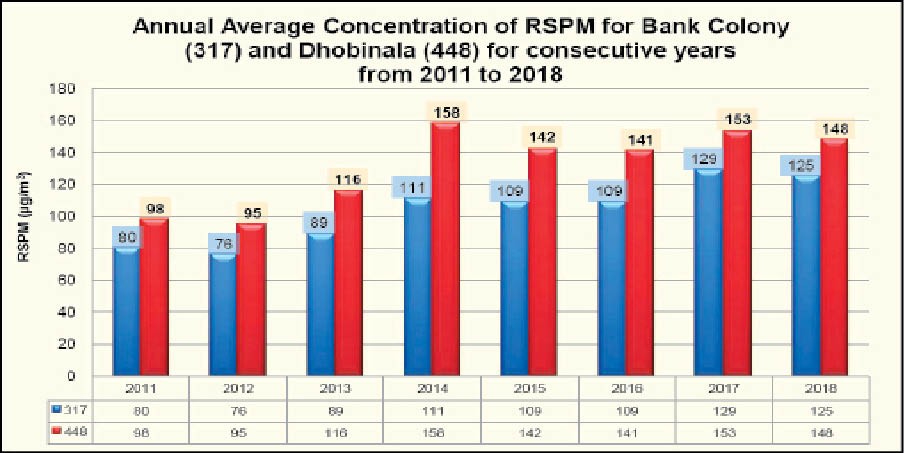Graph illustrating the Annual Average Concentration of Particulate Matter (RSPM) in two air monitoring stations in Dimapur. The Nagaland Pollution Control Board (NPCB) which monitors the stations under the National Air Monitoring Programme (NAMP) has noted that during 2011-2018, the RSPM levels exceed the permissible annual average limit of 60µg/m3. (Image: Morung via NPCB handout)

DIMAPUR, MAY 15 (MExN): The Nagaland Pollution Control Board (NPCB) on Wednesday reminded citizens that air quality is deteriorating in the state with air pollution failing to meet guidelines for safe levels, putting people at additional risk of respiratory disease and other health problems.
It said the deteriorating air quality is evident in the ambient air quality reports of Dimapur and Kohima districts it had compiled under the National Air Monitoring Programme (NAMP).
With graphs illustrating the Annual Average Concentration of Particulate Matter (RSPM) for 4 (four) air monitoring stations in Dimapur and Kohima, the NPCB pointed out that the annual average concentration of Respirable Suspended Particulate Matter (RSPM) during 2011-2018 shows that the RSPM levels exceed the permissible annual average limit of 60µg/m3.
While the graphs showed slight improvement over the previous year in 2018, the RSPM levels have increased drastically in all four stations between 2011 and 2018 : 80 to 125µg/m3 in Bank Colony, Dimapur; 98-148µg/m3 in Dhobinala; 62-88µg/m3 Below NST Office, Kohima; and 92-125 µg/m3 in PWD junction, Kohima.
It said the major sources of air pollution in Nagaland can be traced to sources such as road dust from poorly maintained roads, vehicular emissions further enhanced by traffic congestion, burning of waste, emissions from small-scale industries and construction and demolition activities.
With open burning of waste another major contributor to the air pollution levels, the NPCB urged citizens not to throw or burn their waste in open public spaces. It also pointed out that ban on open burning of waste have been notified by the NPCB as well as concerned authorities as per section 15 of the Solid Waste Management Rules 2016.
Deforestation occurring especially with increasing urbanization has been a rising concern in recent decades especially since the recognition that it is the cause of climate change, it added.
With World Environment Day 2019 to be observed in June 5 on the theme ‘Air Pollution,’ the NPCB has urged all citizens to come forward and play their part in dealing with air pollution and also spread awareness about the importance of breathing fresh, healthy air and adopt practices which will improve the quality of the air we breathe.


